Arak Delivers a Turkey
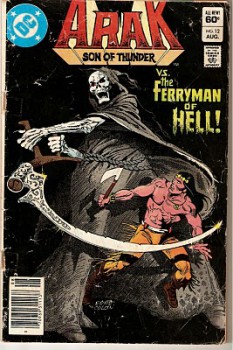 Happy Thanksgiving. All punning aside, issue 12 is a bit of a disappointment to this reader, especially coming on the heels of the most entertaining installment in the first year of the series.
Happy Thanksgiving. All punning aside, issue 12 is a bit of a disappointment to this reader, especially coming on the heels of the most entertaining installment in the first year of the series.
The premise itself is plenty fun: it’s like Roy Thomas thought, hey, I’ve got Arak here on Mount Olympus; before he moves on, I should work in some run-ins with a couple more creatures of Greek myth. Cerberus. Charon, Ferryman of the Dead. And I’ve got the perfect way to tie them in!
Great. Sign me up. I’m on board. I’ve got some change in my pocket for ye olde skull-face ferryman, as long as it’s a two-way trip.
What seems to have been phoned in this issue is the writing. The dialogue and the narration read like someone filling in for Thomas, a poor imitation. Maybe he was on a tight deadline for this one; maybe the whole thing was rushed — Ernie Colón’s art and layouts also pale in comparison to his work on the previous issue. The exception is the back-up feature, which I’ll get to later.
Granted, when you’re writing serially to a deadline, you’re not going to hit the mark every time. Sometimes the inspiration does not strike. The Muse is on vacation. But you’ve got to sit down at the typewriter anyway and deliver something. I write a weekly column; I can sympathize.
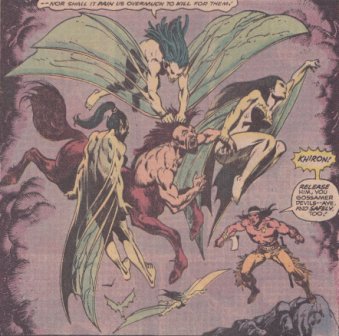
Ordinarily, Thomas’s dialogue is peppered with clever banter and witty barbs. The narration, albeit melodramatic (as one expects of this pulp style), usually delivers its share of memorable turns of phrase, and even at its most ornate and flowery, it sometimes achieves a poetic cadence (we’re not talking Longfellow or even Leiber, but pretty good for a comic book).
Yet this time, unlike previous posts, I don’t have much to quote. That alone is indication that something is off. Lacking are the witty exchanges, the clever repartee: the characters this time out mostly just deliver bland exposition, spelling out their motivations and narrating aloud what is happening. The dramatic declamations come out like bad Thor-speak.
All I really want to do this week, then, is give a brief summary of the plot.
I will provide a few quotations, though, just to illustrate why the less quoted from this one the better. Beginning with the very first words of the issue, as Arak looks pleadingly skyward and declaims:
“Why, you gods of ancient Grecian hills? Why must Khiron the Centaur die, after so many long eons — slain by the hand of brutal Byzantine warriors?”
I didn’t know Arak was so sentimental. Or such a fan of alliteration.
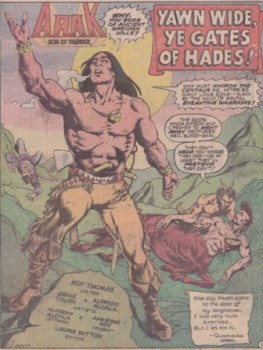 Satyricus the satyr, kneeling mournfully over his fellow creature of Greek legend, tells Arak, “The gods whom Khiron and I prayed to went away centuries ago, blood-skin. They can’t hear you where they are — or at least they’ll pretend they can’t!”
Satyricus the satyr, kneeling mournfully over his fellow creature of Greek legend, tells Arak, “The gods whom Khiron and I prayed to went away centuries ago, blood-skin. They can’t hear you where they are — or at least they’ll pretend they can’t!”
And that’s a halfway decent line, but he delivers precious few quotable ones the rest of the issue. Perhaps being in mourning has taken the wit out of him.
Incidentally, Satyricus is always calling Arak “blood-skin” or “red-hand,” sly variations of the standard “red-skin” that most Europeans who’ve encountered the last of the Quontauka spit out. Ironically, you look at that first page and Arak’s skin tone is the same as that of both Satyricus and Khiron (at least their human halves). In later pages, he’s a tad darker, like maybe he has slightly more of a tan than his companions. But I’ve pointed out in an earlier post how historically questionable this slur would be, anyway, for Europeans to adopt on first seeing a native American. The hue of the New Worlder’s skin would be little different from many familiar darker-skinned peoples from Asia, Africa, and the Middle-East (the term “red-skin” originated when colonists to the Americas encountered specific tribes that dyed their skin with red pigments). But I dye-gress.
Arak warns the lachrymose satyr to skedaddle before other Byzantine warriors return, then sets off to search for Valda. Satyricus decides to tag along with the son of thunder, but they don’t get far when they hear a groan — Khiron!
They’re not beating on a dead horse when they return to find the centaur alive, in a manner of speaking. Khiron explains — in a voice that Arak observes sounds like it emanates “from a far distance, as if from beyond the grave itself” — that worshippers of the gods of Olympus must travel to their death by a different path. He has just enough strength to complete this journey, but first he asks Arak to remove the arrow that pierced his back and projects from his breast.
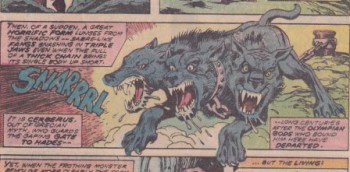 Arak wrenches it the rest of the way through, and that is a painful ordeal, as you can well imagine. But when Arak apologizes for the pain, Khiron mutters, “It is — sweet pain I feel — for I know — it is the last I shall feel — of anything.”
Arak wrenches it the rest of the way through, and that is a painful ordeal, as you can well imagine. But when Arak apologizes for the pain, Khiron mutters, “It is — sweet pain I feel — for I know — it is the last I shall feel — of anything.”
Arak offers to help him complete his death-quest (and I’ve never seen anyone get sidetracked as often as Arak — just earlier that night he was threatening to kill the centaur himself in order to get on with finding Valda). But hey, you’ve got to respect Arak’s capacity for empathy. Typical S&S antihero he is not.
Khiron, however, refuses his offer, explaining that he must complete the journey on his own. Before they part ways, he beseeches Satyricus to take care of Arak, the student he will not now be able to tutor, in his stead.
A little side note here. We learned last issue that Khiron was mentor to Heracles, which jibes with Greek myth. The 1997 Disney animated film Hercules, however, has young Hercules tutored by a satyr. There may have been some other precedent for that of which I am not familiar (not that fidelity to source material has ever been a major concern for Disney Studios), but what if the idea of substituting a satyr for the centaur mentor came from the screenwriters having read Arak comics when they were kids?
Then we get a change of scene, and one of the most hackneyed segues I’ve read in ever. We see the sun rising. Through the next two panels we pan down to the ghastly visage of Brutius with his facial scar running through a milky-white eye. It’s accompanied by this narration:
“The morning sun: In ages past, men have thought of it as the Eye of Ra — as pagan Hyperion…or even as Apollo, driving a fiery chariot across the lightening sky. But to Valda, the Iron Maiden…Christian warrior of distant Frankland…from this dawn forward — it will ever mean the cruel, unpitying gaze of Brutius, commander of her Byzantium-born captors.”
File that little piece of hyperbole away for now, because I’ll be coming back to it.
Valda and Brutius are bickering. She’s demanding he let her go; he’s uttering villain clichés like “That is good, for I like my women wild as the Grecian wilderness I was sent to tame.”
This is interrupted by the return from the other encampment of the sole survivor of the raid by Arak and his Grecian companions. This, then, was the guy who shot the arrow through Khiron’s heart, but in a minor continuity gap, he’s a completely different person — unless, in the preceding hours, he dyed his hair and shaved his moustache.
Brutius treats him brutally, clobbering him over the back of the head, but he immediately gets all excited about the prospect of recovering the body of the centaur for his queen: “ . . . what better way to make myself glow in her eyes, than to drag before her throne a creature out of fable!”
He jumps on his horse, utters a foreboding promise about dealing with the wench Valda when he returns, and rides off with four of his unlucky men in tow.
Arak and Satyricus are on their way to the Byzantine encampment when they hear the horsemen approaching. They overhear the now-verbose Brutius urging his men on to claim the spoils of a centaur corpse. Realizing that Brutius and his men are going to spoil the final hours of noble Khiron’s death, Arak and Satyricus set off after them.
Meanwhile, Khiron has come to the gate of Hades. Three-headed Cerberus stirs and snarls at him, but then realizes the centaur is mortally wounded and lets him pass, “for, it is not the dying whom Cerberus was meant to keep out of Hades…but the living.”
Speaking of the living, Brutius and his men show up next. When one of his men wonders aloud how they will ever get past the hellhound, Brutius, ever resourceful, chooses that soldier to stab and throw to Cerberus. Why this spontaneous little plan should have worked, I don’t know. So the dying man is like throwing a steak to a Doberman guard dog? If that’s all it takes to get past Cerberus is for the hellhound to get one person, then any party of more than one person who ever tried to get past should have gotten past — minus the first unfortunate person Ceberus got ahold of. But I’m quibbling.
So Brutius and his remaining three men steal past the “slavering devil-beast.” Mere moments later Arak and Satyricus arrive; an impressive feat considering they were following mounted men racing at full gallop.
Arak also wonders aloud how they’ll get past Cerberus, who is still feasting on the last person who asked that. This time, there is no stabbing of a comrade a la sacrificial victim; Satyricus simply pulls out his pipes and pulls an Orpheus, lulling Cerberus to sleep. Before they pass the hellhound triple-snoring in the “red ruin of a half-finished meal,” Satyricus rifles through the soldier’s garments. Arak questions why the satyr would need human gold, but Satyricus informs him that he’ll see soon enough what’s up.
Back to Khiron, who has reached the “icy waters of a river dark as death — a river which the Greeks of the old did call the Styx.” What the hell kind of writing is that? Do you think Thomas was drunk?
The first words Charon the ferryman utters on seeing the dying centaur are, “As I live but do not breathe!”
Khiron pleads to be allowed passage, though he has no money to give the ferryman. Charon makes an exception. Standing like the Grim Reaper with his hooded cloak and scythe, he intones,
“Since the Elder Gods went away, the River Styx is not much crossed, even by one-way traffic…but it will be an honor to have the long-lived Khiron become perhaps the last new resident of time-devouring Hades.”
And, since the ferry is apparently too small to accommodate horses, Khiron wades across the river that will ever-after be better remembered as a ‘70s prog-rock band.
Now Brutius and his men arrive. Being Greek-born, he knows how to placate the ferryman, handing over a bag of Byzantine coins. And off they go.
And when the ferryman returns a third time to find Arak and Satyricus waiting, he must be wondering if someone advertised a rock festival in Hades that he wasn’t informed about.
Next, we’ve got to get a showdown between Arak and Charon: it’s the image featured on the cover, right? Even though it makes little sense. So to contrive this matchup, Arak decides he’s going to take the ferryboat by force to get across. He does this before Satyricus can intervene and offer payment.
First, he wades into the dark river and asks for free passage. Impressed, Charon observes, “Interesting! The River Styx is instant death to most mortals. Whoever you may be, you are obviously under the protection of some higher power.”
Still, no dice on the free passage. So Arak draws his blades and tries to board the boat like he used to with his “Viking brethren.”
To dissuade our rash hero, Charon demonstrates that his scythe can slice clean through rock. To which Arak counters, “It’s not rocks my blades will be seeking, boatman, but your heart — if you have one!”
“That’s just it,” Satyricus warns, “he doesn’t! Charon, put aside your scythe, I beg of you. See here? I have the fare!”
“Well, why did you not say so before?” Charon asks. “Lower your weapons, red one. [Even Death gets the impression Arak’s skin is red!] We have nothing to fight about, it seems.”
And the narration informs us that “in his own heart, Arak rejoices. For, he has known all along…Death cannot die.”
Which begs the question, what exactly was he planning to do, anyway?
And Arak raises another question, this time to Satyricus, about why the satyr didn’t inform him all along that he had the fare covered with a gold coin from the dead soldier’s purse.
Satyricus lamely explains, “I — I lost my courage when I saw the boatman, and I was afraid to go on.” [He might have added, Plus it was in my contract that you two exchange a few blows to justify the cover art.]
The two arrive on the other side just in time to intervene as Brutius and his men are attempting to take Khiron dead or alive. They make short work of the soldiers. Khiron gets to go off with dignity to his lonely death.
Oh, and…remember all that about Brutius? A couple issues back, when Arak first made eye contact with him, the narrator breathlessly informed us that never before or since would Arak stare so directly into the face of evil. (Remember, Arak has been face-to-face with actual devils.) Earlier this issue, we were told that seeing his face in the morning would ever after spoil sunrises for Valda, the Iron Maiden. Really setting him up to be an über-villain, right?
Arak grabs him by the throat, holds his head beneath the waters of the Styx, and drowns him. Two panels, no fanfare, not even any words exchanged. Done. What was all that seeming foreshadowing about? For all the misfortune it seemed he would be visiting upon Arak and Valda, it turns out that the only direct harm he did to them was to kidnap Valda and make a lot of admittedly nasty threats none of which he will ever carry out.
Thomas did that once before, early on in the series: introduce a character who he seems to be setting up as a real villain who’ll pose a threat to Arak, then have that character summarily die (and, in that case, off-panel). Misdirection, maybe? Thomas just growing tired of the bad guy? Dunno.
VALDA SHINES
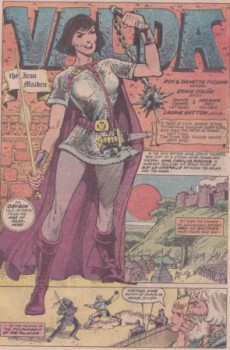 Okay, this issue has a seven-page backup story, an origin story for our favorite Iron Maiden (not to be confused with the ‘80s heavy-metal band). And this must’ve been where all involved put most of their time this issue, because it is a fair sight better than the feature story. It is co-written by newlywed Roy with his wife Danette Thomas. Colón’s art, which he inked himself, is far more detailed and polished.
Okay, this issue has a seven-page backup story, an origin story for our favorite Iron Maiden (not to be confused with the ‘80s heavy-metal band). And this must’ve been where all involved put most of their time this issue, because it is a fair sight better than the feature story. It is co-written by newlywed Roy with his wife Danette Thomas. Colón’s art, which he inked himself, is far more detailed and polished.
We learn some interesting things about Valda. Turns out she is the bastard daughter of her king, Carolus Magnus. Also her mother, the warrior Bradamante who fell in battle alongside brave Sir Roland, made court magician Malagigi swear that he would raise her daughter to be a lady of the court, and by no means allow her to follow in her mother’s armored footsteps. This same promise she gained from the king, so it seemed that Valda was not going to be allowed to join in any reindeer games, at least not if they involved swords and tactical combat.
Until one fateful night…a young Valda overhears her foster-father Malagigi conjuring up the spirit of “Amadis of Gaul, most puissant knight of yore.” Valda remembers the incantation, and night after night calls up the ghost-knight herself for clandestine training sessions. Thus she is able to become a warrior.
Years later, skipping over puberty and all that, she enters the King’s Tournament disguised as the “knight all in scarlet,” and bests Rinaldo the King’s champion. Then she takes off her helmet and Surprise Daddy! (Although actually it is unclear whether Valda knows her true lineage, that she is indeed a royal princess. Probably not.)
The King is bound by the laws of his tournament to christen her a knight.
In the final panels, we follow Malagigi as he reflects on what has transpired, and we learn that he intentionally let Valda overhear his summoning of the knightly ghost all those years ago, as a way to circumvent his promise to Valda’s mother.
“Did I do wrong, Bradamante,” he wonders, “to thwart your momentary will, and leave the girl free to chart her own destiny? I’d like to think you know what I did, and that you understand… and forgive… but, by gods both sacred and profane… I will never quite be sure…!”
Nice little coda to that one.
And the teaser for next issue is:
Starting next issue: By popular request! A VALDA SOLO SERIES!
The fact that she’s going to be starring in her own back-up stories may be a good indicator that she and Arak aren’t going to hook back up again for a while.
You know that cover reminds me of the cover to Batman #237 “Night of the Reaper.” It’s not exactly the same, but it does bring it to mind.
Anyway, after last issue’s build-up I was really hoping for something epic. Maybe a match-up with the gods to save Khiron. This just seems kind of there. Which is kind of odd, isn’t it? Don’t issue number twelve’s (if the book makes it that far) usually have some kind of big, wrap-up of the main storyline to celebrate making it through a year or two – depending on the publishing schedule? And was Thomas setting up a big reveal about who Arak’s patron protector was? Or was it just a tossed-off comment, do you think?
The Valda back-up sounds great. I miss comics with back-up stories. It just seems like you got more for you sixty cents with them. And apparently Malagigi has always been a sneaky type.
I’m sorry the issue wasn’t a good one, but your review was great. Looking forward to the next one.
@Ilene: You’re right; a twelfth issue would usually be accompanied by some kind of fanfare about being the one-year anniversary. In fact, issue 24, to celebrate two years, is a double-sized issue. The absence of any big wrap-ups here may be attributable to it being a sort of rushed filler story (purely conjecture on my part, but based on textual and visual evidence).
My guess is that they invested more this time into that Valda back-up story and had to deliver something to just sort of keep the main feature moving along. That they would kill off Brutius, whom they seem to have been grooming as a major adversary for three issues, so casually is still a little surprising to me.
As for Arak’s paternal lineage: I think Thomas is going to milk that a little further before any big reveals.